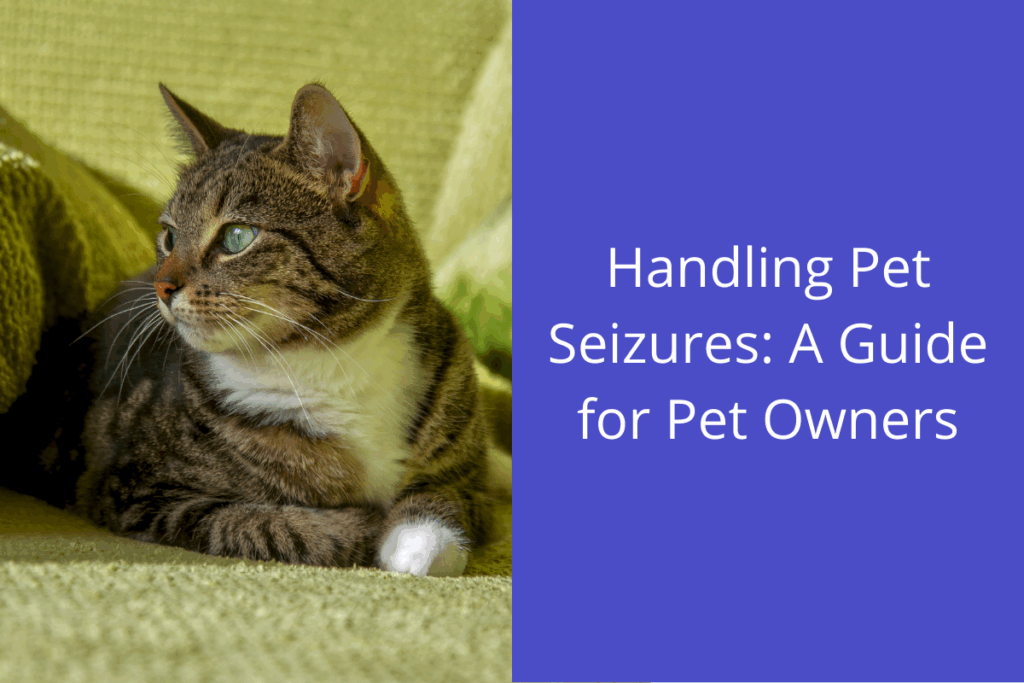As pet owners, we must be prepared for all kinds of health emergencies affecting our furry friends. One such alarming situation is when our pets experience seizures. Witnessing a seizure can be distressing, but knowing how to handle it can make a significant difference in your pet’s well-being.
Understanding Seizures
A seizure occurs when the brain has sudden and abnormal electrical activity. This activity can cause your pet to lose control of their body, leading to twitching, convulsions, muscle rigidity, and even loss of consciousness. Seizures can be caused by various factors such as epilepsy, brain tumors, toxins, or other underlying health conditions. It is essential to consult your veterinarian to determine the cause and get appropriate treatment for your pet.
Recognizing the Signs of a Pet Seizure
The first step in managing pet seizures is recognizing the signs. Seizures in pets can manifest in various ways, from noticeable convulsions and twitching to more subtle signs like temporary confusion or staring into space. Understanding these signs is crucial for prompt intervention. Watch for unusual behaviors like restlessness, drooling, or sudden collapsing, as these could be precursors to a seizure episode.
Immediate Steps to Take During a Seizure
The most crucial thing to remember when your pet experiences a seizure is to remain calm. Panicking can escalate the situation and potentially harm yourself or your pet. Here are some steps to help you handle pet seizures:
- Clear the Area: Remove any nearby objects or furniture that could injure your pet during the seizure. Create a safe zone by ensuring no sharp corners or hazardous items are around.
- Dim the Lights: Reduce bright lights or turn off any sources of loud noise. Sensory stimulation can trigger seizures, so creating a quiet and calm environment can be soothing for your pet.
- Monitor the Duration: While it might feel like an eternity, seizures typically last between 1 and 3 minutes. It’s crucial to keep track of the time to inform your veterinarian accurately.
- Do Not Restrain Your Pet: It may be tempting to hold or restrain your pet during a seizure to prevent them from injuring themselves. However, it’s essential to remember that your pet is unaware and may unintentionally bite or scratch you out of fear or confusion. The best course of action is to let the seizure run while ensuring their safety.
- Take Note of the Seizure Details: Observe and record any important details about the seizure, such as the type of movements exhibited by your pet, any loss of consciousness, vocalizations, or changes in bodily functions. Providing this information to your veterinarian can be valuable for diagnosing and understanding the condition.
- Provide a Comforting Presence: Once the seizure has ended, be there for your pet. Speak softly and gently stroke their fur to provide reassurance. Remember that disorientation and confusion are common after a seizure, so avoid sudden movements or activities.
Post-Seizure Care and Observation
After a seizure, pets often experience confusion and disorientation, known as the postictal phase. During this time, keeping them in a quiet, safe space and monitoring them closely for any further abnormal behavior is essential. Comforting your pet gently and providing water are good ways to help them recover. Be aware that multiple seizures in a short period or a seizure lasting more than five minutes is a medical emergency.
Treatment Options and Management
Treatment for pet seizures may include medications to control or reduce the frequency of episodes. Following your vet’s instructions closely is vital, as is never adjusting medication without professional advice. Regular follow-ups and monitoring are crucial to managing this condition effectively. In some cases, dietary changes or supplements may also be recommended as part of a holistic approach to treatment.
While not all seizures can be prevented, maintaining a healthy lifestyle for your pet can reduce risks. Regular veterinary check-ups, a balanced diet, and avoiding known seizure triggers are essential. Be vigilant about any changes in your pet’s health or behavior, as early detection of issues can prevent complications.
Expert Seizure Management and Care at Small Animal Emergency Hospital of Westfield
In conclusion, understanding and effectively managing pet seizures is crucial for the health and well-being of your furry friend. At Small Animal Emergency Hospital of Westfield, we’re dedicated to providing comprehensive emergency care for your pets in their hour of need. If you’re concerned about your pet’s seizures or other health issues, don’t hesitate to book an appointment with us. We’re here to offer pet owners expert care and peace of mind. Remember, the best care is proactive care, and we’re here to support you and your pet every step of the way.








